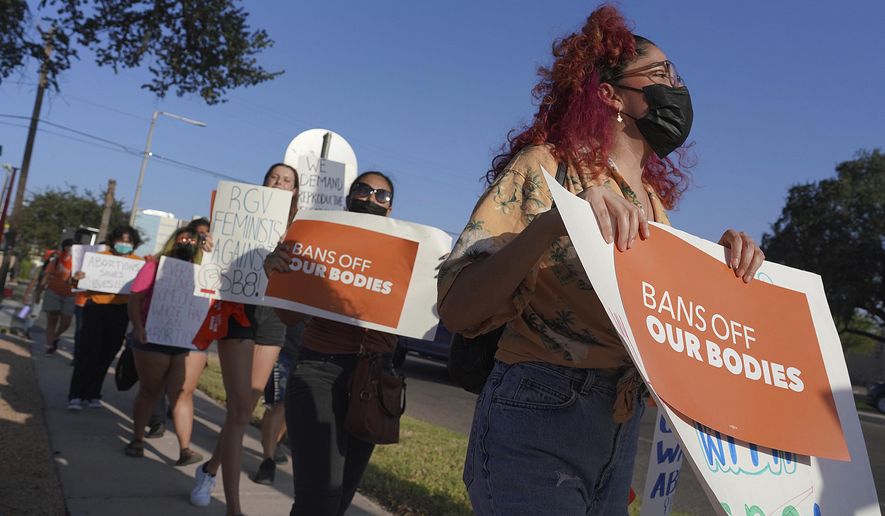The Supreme Court refused to halt Texas’ law banning abortions last week after a fetal heartbeat is detected, but it did agree to quickly take up the case, scheduling it to be heard Nov. 1.
The justices will decide if the federal government can sue the state, given that state officials don’t enforce the law — private citizens do.
Justice Sonia Sotomayor dissented in part, saying she disagreed with the court’s move not to halt the law while the litigation is pending.
“These women will suffer personal harm from delaying their medical care, and as their pregnancies progress, they may even be unable to obtain abortion care altogether,” she wrote Friday.
The Justice Department petitioned the justices on the matter Oct. 18 after the 5th U.S. Circuit Court of Appeals allowed the law to remain in effect while litigation moves through the courts.
Texas had asked the justices not to grant the Justice Department’s request to bat down the law.
The state responded in a filing to a request from President Biden’s Justice Department to block the law, known as Senate Bill 8, saying the Justice Department doesn’t have standing — or a sufficient injury — from the Texas law to warrant review in the court.
The state also noted the federal government sued Texas, but Texas officials do not enforce the law — private citizens are the ones to bring civil lawsuits against abortion providers who perform an abortion past a detection of the fetal heartbeat.
The federal government, meanwhile, said women will continue to face “irreparable harm” if the court does not temporarily block the law.
Though the high court did not grant that request, it did agree to hear the dispute before the 5th Circuit rules on the matter.
The case reached the circuit court after Texas appealed following U.S. District Judge Robert Pitman, an Obama appointee, initially blocking the law, siding with the federal government. The 5th Circuit, though, quickly reversed that move.
The Texas law bans abortion at about six to eight weeks of pregnancy, which is about the time a fetal heartbeat is heard.
The Justice Department has argued the Supreme Court precedent dating back decades gives women a right to an abortion up until a fetus is viable.
Under the law, state officials don’t enforce the abortion ban, but private citizens can sue if they have knowledge a provider illegally performed an abortion after a heartbeat was detected.
Texas women have been traveling to neighboring states to receive abortions due to the legislation, according to The Associated Press.
The Supreme Court declined to block the law’s implementation last month, leaving the legislation in place while litigation against it continues in lower courts.
Abortion providers challenged the law initially — prior to the Justice Department filing its separate lawsuit — and the providers have asked the high court to get involved before a lower court issues a ruling.
That case is also expected to be heard by the justices on Nov. 1. The justices will evaluate the state’s private citizen enforcement scheme.
The Supreme Court, in declining to halt S.B. 8’s enforcement, did not resolve whether the law was constitutional.
The abortion providers had sued state and local officials, but under S.B. 8, it would be private citizens bringing the lawsuits against the providers.
Anyone who successfully sues someone who assists in an abortion after six weeks would receive at least $10,000.
Since the Supreme Court decided in 1973 that women had a right to abortion in the case of Roe v. Wade, pro-life advocates and conservative states have aimed to chip away at that ruling.
Texas is not alone in its recent attempt.
The Supreme Court has agreed to decide if Mississippi’s ban on abortion after 15 weeks runs afoul of its Roe ruling during its new term, which began this month. The case will be heard in December with a ruling expected in June.
Unlike in the Texas case, lower courts blocked the Mississippi law from taking effect.
• Alex Swoyer can be reached at aswoyer@washingtontimes.com.
• Emily Zantow can be reached at ezantow@washingtontimes.com.




Please read our comment policy before commenting.